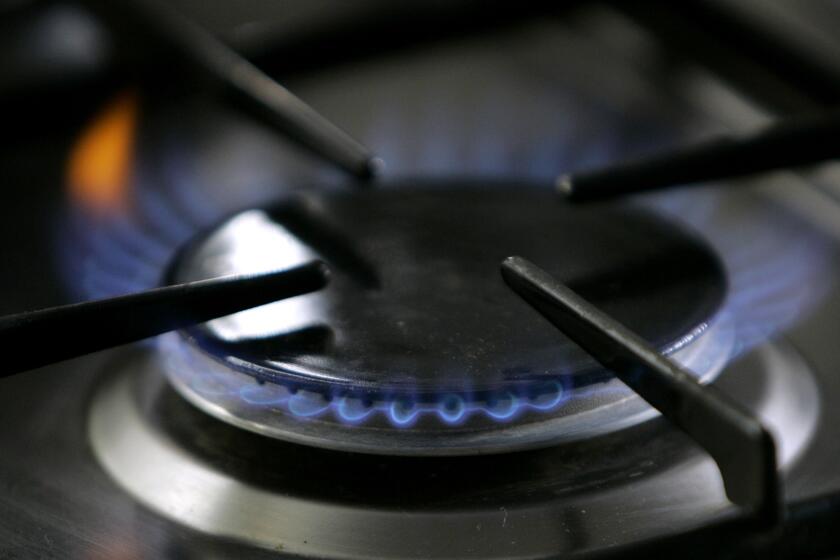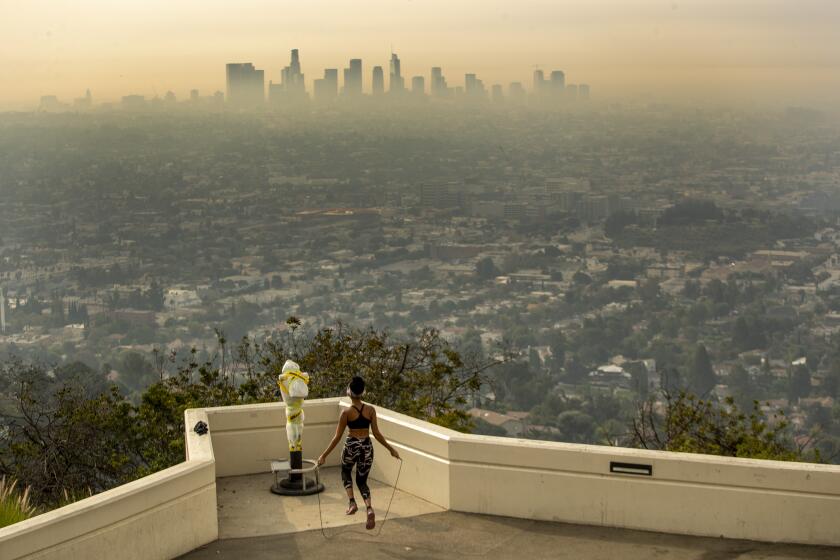Editorial: 2022 brought more heat and pollution. We’re still careening toward climate disaster

- Share via
You can’t say the 2022 climate data coming out is surprising. But it sure is alarming.
U.S. federal agencies last week reported that 2022 was either the fifth or sixth hottest year on record, depending on the accounting method used. The 10 warmest years over the last 143 years have all occurred since 2010. Another study showed the amount of heat being taken up by Earth’s oceans reached another record high last year.
Meanwhile, the pollution that causes global warming just keeps rising. U.S. greenhouse gas emissions increased by about 1.3% in 2022 compared with the previous year, according to an analysis by the research firm Rhodium Group, marking the second year in a row that planet-warming pollution has gone up after declining earlier in the COVID-19 pandemic.
The data highlight the immense disconnect between the symptoms our overheating planet is showing and what we are doing about the problem. And it’s another stark reminder that despite some recent progress on climate policy, such as the passage of the Inflation Reduction Act, the country is still on a reckless path in the wrong direction. Earth is already about 2 degrees Fahrenheit warmer than it was in the late 19th century, and we are continually at the precipice of greater suffering and loss.
There is no federal plan to ban gas stoves. But it is clear that they are harmful sources of indoor air pollution and should be phased out.
These annual reports are indicators of the most important metrics of the health of our environment and should be far more distressing to Americans than the pace of inflation, interest rates or the price of gas. Yet they’re so painfully routine at this point that people seem to have grown numb to the implications. The temperature records are, as Times reporter Corinne Purtill wrote, “the latest confirmation of a global climate trend that manages to be at once astonishing and dismally predictable.”
Even more unrelenting is the data from Earth’s oceans, which are bearing most of the load of humanity’s production of greenhouse gas pollution by absorbing more than 90% of the warming. Ocean heat, which fluctuates less than air temperatures, has set a consecutive string of records. The rise in ocean temperatures has accelerated since about 1990 and “is so steady and robust that annual records continue to be set with each new year,” researchers stated in a paper published last week.
Mayor Karen Bass says the climate crisis is among the greatest challenges facing Los Angeles, but she will need to approach it with the same urgency as housing and homelessness.
There are some bright spots in the recent data. Renewable energy surpassed coal to generate 22% of the nation’s electricity, a first since the 1960s. But some of the decline in coal-fired power generation was offset by an increase in the burning of natural gas, another fossil fuel.
The U.S. is also in a much better position compared to even a year ago, when the federal government had yet to enact significant climate policy. President Biden’s signing of the Inflation Reduction Act last year changed that. While it’s the biggest step Congress has ever taken to address global warming, it’s not enough. Experts estimate that the suite of rebates, incentives and other policies that are starting to roll out to encourage the deployment of renewable energy, electric vehicles, appliances and emissions-cutting projects will only get us part of the way to our climate goals.
Leaving the daily standard at the same level set 16 years ago would give Americans the false impression that the air they are breathing is safe.
But political realities have also changed. Republicans now hold a narrow majority in the House and spent some of their first several days in power trying to score points in the nation’s culture wars by going ballistic over a nonexistent ban on gas stoves. If that is any indication of what’s to come, House Republicans will try to obstruct climate action instead of acting to protect the American people from an existential threat that’s growing worse by the year. That means state and local efforts to cut emissions will be more important than ever, just as they were during the Trump presidency.
Leaders at all levels of government will need to keep slashing pollution as quickly as possible, or the nation will have no chance of cutting climate-warming emissions in half by 2030, as Biden has pledged under the international Paris climate accord. That’s the pace and scale of change to prevent a truly catastrophic future. But we are still falling short.
Just as the public should not simply accept increasing pollution and rising temperatures as unavoidable steps on a march toward calamity, politicians should not shrug and tolerate a slow shift to zero-emission technology.
Our leaders need to treat the climate crisis with the focus and urgency of a disaster endangering the lives of everyone on the planet. Because, after all, it is.
More to Read
A cure for the common opinion
Get thought-provoking perspectives with our weekly newsletter.
You may occasionally receive promotional content from the Los Angeles Times.













